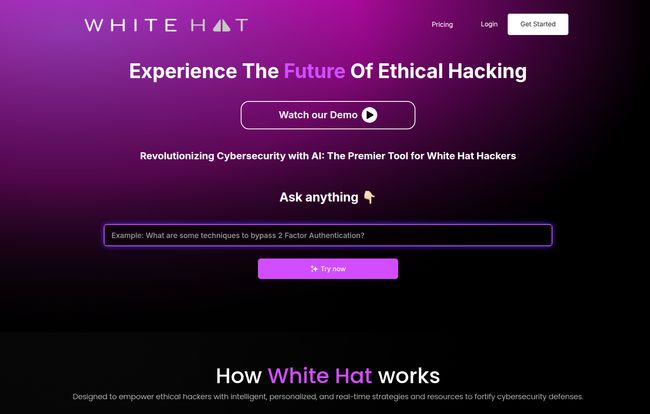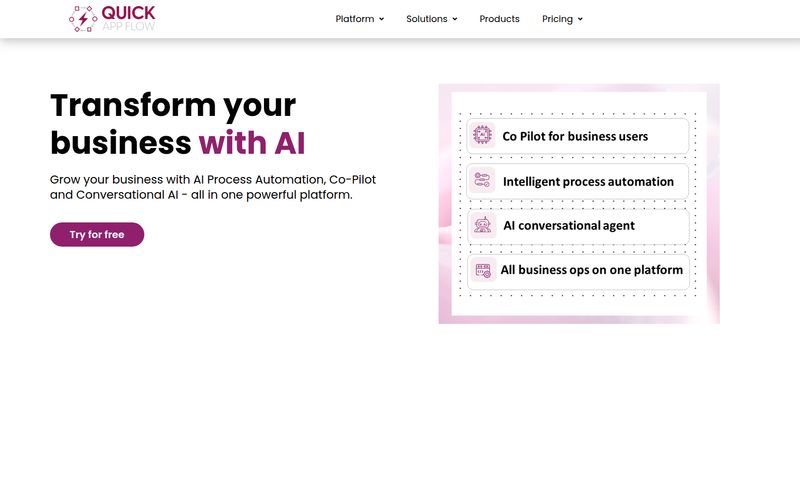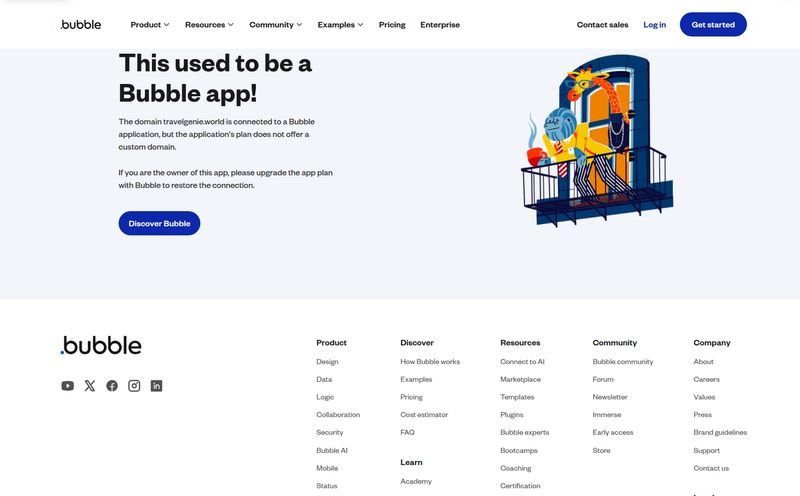If you've been in the cybersecurity game for more than five minutes, you know the drill. The learning curve isn't just steep; it's a sheer cliff face you're constantly scrambling up. New vulnerabilities drop while you're sleeping, new defensive tech goes live before your coffee's brewed, and staying ahead feels like a full-time job on top of your full-time job. I've spent more nights than I can count digging through arcane forum posts and dry-as-dust documentation just to understand a single attack vector. It’s the life we chose, right?
So, when I see another tool promising to be the “future of ethical hacking,” my professional skepticism kicks in. Hard. But this time, it’s an AI chatbot called White Hat, and I’ve got to admit, my curiosity got the better of me. An AI specifically designed for us? For the pentesters, the bug bounty hunters, the blue teamers who are tired of reinventing the wheel? I had to see for myself.

Visit White Hat
So, What Exactly Is This White Hat Thing?
Let's get the jargon out of the way. White Hat is an AI-powered cybersecurity chatbot. Think of it less like a generic ChatGPT and more like having a senior pentester on call 24/7, ready to answer your questions. Its brain has been fed a massive dataset of cybersecurity information, from offensive tactics (the Red Team stuff) to defensive strategies (the Blue Team playbook). The whole idea is to give you intelligent, personalized, and quick answers to your cyber queries, whether you're brainstorming an attack path or figuring out how to patch a stubborn system.
It’s not just a search engine. It’s designed to be a partner in crime—ethical crime, of course. It’s meant to help you build strategies, master skills, and get insights that you’d normally have to piece together from a dozen different sources. I was intrigued, to say the least.
My First Five Minutes with White Hat
Logging in, the interface is clean. Minimalist, even. No clutter, just a prompt: “Ask anything.” It’s both inviting and a little intimidating. My first instinct wasn't to ask something simple. I went straight for the example I saw on their homepage: “What are some techniques to bypass 2 Factor Authentication?”
Now, this is where things get interesting. A tool like this walks a fine line. The response it gave was detailed, technical, and covered methods like SIM swapping, phishing for session cookies, and exploiting recovery flows. It didn't give me a step-by-step “how-to” for dummies, but it laid out the theoretical frameworks and known vectors. It felt… professional. It was information you could find publicly, but it was collated instantly. For a professional, this is gold. It saves time. For someone with bad intentions, it's a stark reminder of the power we wield and the responsibility that comes with it.
The Core Features That Actually Matter
A pretty interface is nice, but it's the engine under the hood that counts. After playing around for a few days, a few features really stood out to me.
AI-Guided Skill Mastery: Your Personal Mentor
This isn't just about asking a question and getting an answer. I tried feeding it scenarios. “I have a web server running Apache 2.4.49, what are some potential misconfigurations I should look for?” The AI didn’t just spit out a list of CVEs. It explained why certain misconfigurations are dangerous and suggested specific commands to check for them. It’s like a Socratic dialogue with a machine. This is way different from just Googling “Apache 2.4.49 exploits,” which often leads you down a rabbit hole of sketchy forums and outdated articles. It feels more like a guided learning path.
Red vs. Blue: Building Strategies on the Fly
I think this is White Hat's biggest strength. The perpetual struggle between offense and defense is the heart of cybersecurity. I’ve always believed the best defenders are the ones who know how to attack. This tool gets that. You can ask it to draft a basic phishing campaign strategy (Red Team), and in the next breath, ask it to outline a user training and email filtering policy to defend against that exact strategy (Blue Team). Seeing both sides of the coin so fluidly is incredibly useful for training and for developing a more holistic security posture. It’s like having a sparring partner that knows all the moves.
The Power of a Continuously Learning AI
Cybersecurity isn't static. What was secure yesterday is vulnerable today. The fact that White Hat's AI is designed for “Continuous Learning” is a big deal. It’s not a textbook that goes out of date the moment it’s printed. It’s constantly being updated with new data, trends, and user feedback. This means it should, in theory, stay relevant as new threats emerge. Time will tell how effective this is in practice, but it's the right approach. A static security tool is a dead security tool.
Who Is This Tool Really For?
Let's be clear: this is not for your grandma or someone who thinks “phishing” involves a tackle box. And frankly, it's not for a complete beginner who doesn't know the difference between an IP address and a URL. You need a foundational understanding to ask the right questions and, more importantly, to understand the answers.
I see the sweet spot being:
- Cybersecurity Students and Enthusiasts: A fantastic learning aid to supplement coursework and labs.
- Junior Pentesters/Analysts: An amazing resource for getting a second opinion or quickly looking up techniques without getting lost in documentation.
- Bug Bounty Hunters: A great way to brainstorm attack vectors and speed up the reconnaissance phase.
- Seasoned Pros: Even old dogs can learn new tricks. I found it useful for quickly generating boilerplate code snippets or reminding me of a command switch I’d forgotten. It's a productivity booster.
Let's Talk Money: The Pricing
Okay, the all-important question. What’s the damage? White Hat is refreshingly straightforward here. There’s one plan with unlimited access.
| Plan | Cost | What's Included |
|---|---|---|
| White Hat Unlimited | $6.99 / week | Unlimited Usage, Full Feature Access, Continuous Updates, 3-Day Free Trial |
At roughly $28 a month, you have to weigh the value. Is it worth it? When you compare that to the price of a single cybersecurity course (often thousands of dollars) or even a good textbook ($50-$100), it seems pretty reasonable. If it saves you even one or two hours of work a month, it has already paid for itself. The 3-day free trial is the clincher for me. It’s a no-risk way to see if it fits into your workflow. I always appreciate when a company is confident enough to let you try before you buy.
The Not-So-Perfect Parts
No tool is a silver bullet, and White Hat is no exception. It’s important to go in with your eyes open. Based on my experience and the nature of AI, here are a few things to keep in mind.
First, it’s all about the input. The old saying “garbage in, garbage out” is truer than ever with AI. If you ask vague questions, you'll get vague answers. The tool’s effectiveness is directly tied to your ability to formulate specific, well-defined queries. Second, there's always the potential for bias. AI models are trained on data created by humans, and that data can contain inherent biases. It’s something the entire tech world is grappling with. Finally, and this is the big one: this is an assistant, not a replacement for your brain. It can't replace the intuition, critical thinking, and hands-on experience that define a good cybersecurity professional. Use it to augment your skills, not to atrophy them.
Frequently Asked Questions
- What is White Hat AI?
- White Hat is a specialized AI chatbot designed for cybersecurity professionals and enthusiasts. It provides real-time strategies, resources, and answers to questions related to both offensive (red team) and defensive (blue team) cybersecurity.
- Is White Hat legal to use?
- Yes. The tool provides information and educational content. How you use that information is your responsibility. It is intended for ethical hacking, penetration testing, research, and defense—activities performed with explicit permission.
- Who should use White Hat?
- It's best for individuals with some foundational cybersecurity knowledge, including students, junior analysts, penetration testers, bug bounty hunters, and even experienced professionals looking for a productivity tool.
- How much does White Hat cost?
- It costs $6.99 per week for unlimited access. There is also a 3-day free trial available to test it out.
- Can White Hat replace a human cybersecurity expert?
- No. It is a powerful assistant and learning aid, but it cannot replace the critical thinking, creativity, and contextual understanding of an experienced human expert. It's a tool to enhance human capabilities, not substitute them.
- Is there a free trial for White Hat?
- Yes, they offer a 3-day free trial that gives you full access to all its features.
Final Thoughts: Is White Hat Worth Your Time?
So, what’s the final verdict? I came in skeptical, and I’m walking away... impressed. Genuinely. White Hat isn’t just another gimmick. It’s a well-designed, powerful tool that understands its target audience. It’s a Swiss Army knife for cybersecurity knowledge, ready to hand you the right tool at the right time.
It won't make you an elite hacker overnight, and it won’t do your job for you. But it will make you a smarter, faster, and more efficient operator. It can accelerate your learning, help you overcome mental blocks, and give you a powerful new way to look at security problems. For $7 a week, and a free trial to boot, I’d say it’s absolutly worth a look for anyone serious about a career in this field. The future of hacking might not be fully automated, but it will definitely be AI-assisted. And White Hat is a pretty compelling glimpse into that future.
References and Sources
- White Hat Official Website
- Understanding Red Team vs. Blue Team (Red Hat)
- How to prevent algorithmic bias in AI (World Economic Forum)



